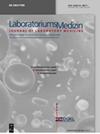基于ige的过敏诊断的质量管理
IF 0.1
Q4 OTORHINOLARYNGOLOGY
Laboratoriumsmedizin-Journal of Laboratory Medicine
Pub Date : 2016-04-01
DOI:10.1515/labmed-2016-0013
引用次数: 15
摘要
摘要:总IgE和过敏原特异性IgE检测是即时型超敏反应和特应性疾病诊断工作中必不可少的血清学检测。IgE检测的技术性能特点和临床应用已在国际指南中公布。在美国和欧洲,IgE测试主要由认可的医学实验室进行,在德国,也由持有石油限制许可证的过敏症专科医生进行。双方都必须持续执行内部和外部质量控制措施,包括每年两次的熟练程度试验(在德国)。由于分析的核心过敏原试剂、复杂提取物和最近定义的过敏原分子的异质性,以及异源分析校准,来自不同诊断制造商的定性和定量sIgE测试的结果可能会有很大差异。熟练度试验结果随后根据每种分析类型分组。通过验收标准取决于国家规定和质量管理。未来的挑战包括更有效的sIgE量化,以便与国际总IgE单位进行真正的比较,以及对最重要的过敏原来源使用统一的过敏原试剂,这在过去阻碍了测定间的可比性。本文章由计算机程序翻译,如有差异,请以英文原文为准。
Quality management in IgE-based allergy diagnostics
Abstract: Assays for total and allergen-specific (s) IgE are essential serological tests in the diagnostic work-up of immediate type hypersensitivity reactions and atopic diseases. Technical performance characteristics and clinical utility of IgE tests have been published in international guidelines. In the USA and in Europe, IgE tests are mainly performed by accredited medical laboratories and in Germany they are also performed by allergists carrying an OIII-limited license. Both have to perform continuously internal and external quality control measures including proficiency trials twice a year (in Germany). Due to the heterogeneity of the assay’s core allergen reagents, complex extracts and more recently defined allergenic molecules, and heterologous assay calibration, the results of qualitative and quantitative sIgE tests from different diagnostic manufacturers can vary considerably. Proficiency trial results are subsequently grouped according to each assay type. Passing acceptance criteria depend on national rules and regarding quality management. Future challenges include a more valid quantification of sIgE which would allow true comparisons with the international units for total IgE, and the use of harmonized allergen reagents for the most important allergen sources, which have hampered inter-assay comparability in the past.
求助全文
通过发布文献求助,成功后即可免费获取论文全文。
去求助
来源期刊

Laboratoriumsmedizin-Journal of Laboratory Medicine
MEDICAL LABORATORY TECHNOLOGY-
CiteScore
0.80
自引率
0.00%
发文量
1
审稿时长
>12 weeks
期刊介绍:
Information not localized
 求助内容:
求助内容: 应助结果提醒方式:
应助结果提醒方式:


